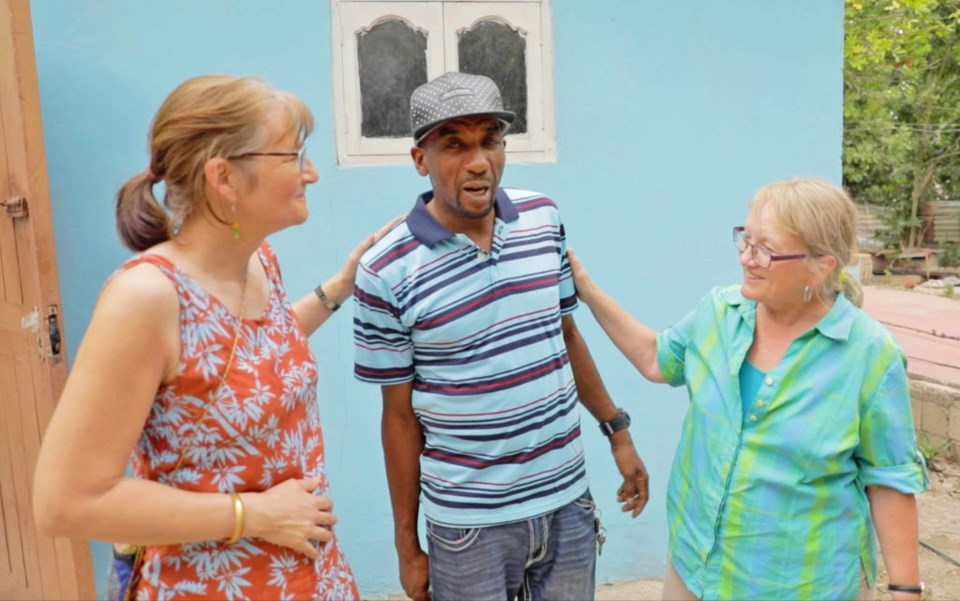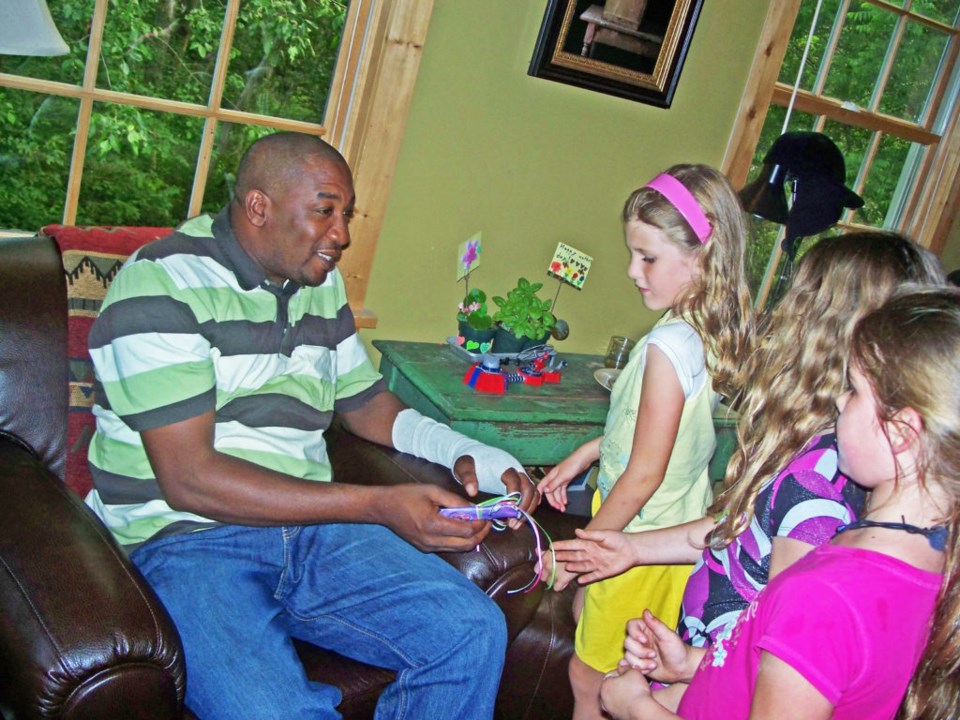
Two Niagara-on-the-Lake families are seeking a permanent solution for a Jamaican farmworker who was seriously injured in a 2008 workplace accident here.
The story of Jeleel Stewart, known to his friends in Jamaica and in NOTL as Bushman, is not unique, they say, but he and his family have captured the hearts of Jane Andres and Jodie Godwin. They are becoming increasingly frustrated at a system which has forgotten this man who came to Niagara as a 33-year-old father and husband, through the Seasonal Agriculture Work Program, hoping to make a better life for his family back home.
In his first and only year here, working in a local nursery, he was injured, making it impossible to return to work, and for the last 12 years, he has struggled to provide even the basic needs for his wife and five children.
He was working on a forklift when it slipped, crushing his left hand, causing severe nerve damage and paralyzing it, despite three hours of surgery.
He received some therapy in Niagara, and was sent home to Jamaica, expecting to receive compensation from WSIB that would cover the medication, therapy and other required care for his recovery, and enough money to support his family.
That lasted for just two years. In 2010, it was terminated.
He was deemed fit for work as a gas station attendant, and told he should seek work in a Niagara gas bar — but he doesn’t live in Niagara, says Godwin, and there were no gas bars near his rural home in Jamaica where he could work.
Godwin and Andres have been financially supporting the Stewart family ever since, working payments into their family budgets to make that possible, says Godwin. “It was only ever to fill the gap that should have been funded by WSIB from the beginning. It was never meant to be in perpetuity.”
In 2017, public attention, including a documentary produced about the plight of migrant workers, and which also told Stewart’s story, pressured WSIB to reinstate his coverage, which lasted for about another two years.
“As the public eye turned away, it was terminated again,” says Godwin.
Even when WSIB was making payments, they were often delayed, and difficult to access, she says, but it has been “some time since he has received anything at all.”
It’s a complicated and frustrating situation, which requires a permanent solution, says Godwin. With only one arm of any use to him, Stewart will never be able to find a job in Jamaica that would pay enough to support his family.
“People don’t realize how expensive everything is in Jamaica. It’s not cheap to live there,” she says. Food and other basics are always costly, but even more so during COVID. Stewart, she adds, will need financial support for the rest of his life.
She and Andres have visited him in Jamaica, where he is highly respected for his faith and his strong work ethic.
The Stewarts live in a very basic house, have no hydro, little food, and for long periods of time exist on only rice and potatoes. Jeleel now has diabetes, and with no money for medication, he lives in pain, and suffers from lack of sleep and poor nutrition. “He was once a big, strong man. He has aged so much,” Godwin says, concerned about his severe depression, that has come as a result of constant pain, and his inability to support his family.
She talks to him by phone, and knows he needs money, but is too proud to ask for it. When he does, she senses desperation. Three of his children were unable to finish their education, but he is trying to keep the younger two in school, especially a daughter who is extremely bright. Education is expensive, and his family makes sacrifices so she can attend a good school.
When Godwin first visited him and his family in Spanish Town in Jamaica, she says, “he was living in one of the poorest homes I’ve ever been in, in a squatters’ neighbourhood, but one of the most joyous homes I’ve ever been in. This is a family who draws others to them.”
They moved for a time out to a more rural area, but returned to Spanish Town recently to be closer to his daughter’s school.
“He is a good man who was injured while he was working here, in Canada. He hasn’t got what he is due,” she says.

In 2008, Leah Godwin was just six years old when she gave Jeleel Stewart a birthday present. They were in the Godwin home in NOTL just after Stewart was injured. His hand has never recovered. With Leah are Annelise and Cierra Perron.
In the meantime, Godwin’s daughter Leah, who remembers Stewart from when he would come to their house in Niagara and has visited his family in Jamaica, has started a GoFundMe page, with a goal of $15,000, hoping to support his family through the coming months, hoping that those lobbying to have his WSIB payments again reinstated will be successful.
She and her brother, Sam Parker, have grown up witnessing their parents help the Stewart family over the years, and have contributed themselves.
While they are hoping for a successful fundraiser, it is only a stop-gap measure, says Leah.
One of her earliest memories of Stewart is when she was just six years old, and he arrived at Parliament Oak school one day with her mother to pick her up.
“It was soon after he was injured, and I saw him across the parking lot. I ran to give him the biggest hug a six-year-old could give this big man.”
Leah, now 19, has been to Jamaica three times with her mother, the first two visits, when she was 11, and then again at 16, visiting the Stewart family.
On their trip earlier this year, they didn’t have enough time to drive through the rural areas, and weren’t able to see them.
Her first visit had a huge impact on her, she says, seeing the small home of a family of five, with rough planks for walls and a dirt floor. As poor as they were, they had taken in two neighbourhood children whose parents were unable to look after them, yet there was lots of singing and dancing, and a generous sharing of what little they had when others stopped by.
Since then, she says, “I’ve been proud of my parents and our community of friends who continue to help them. I hoped then that their life would get better for them, and to know it hasn’t is heart-breaking. They deserve to be able to eat, and to live with dignity. Their kids have such talent, but they have to work to help support their parents, and not at the types of jobs they deserve.”
“WSIB should be doing what they’re supposed to do. Everyone here who is helping them can’t continue to do that forever. What we do, it’s not enough. And they don’t like feeling in debt to others.”
Others are working on compensation for Stewart, says Jane Andres, who has also been supporting the family for the last decade. It’s difficult to get information from WSIB, with a number of changes in contacts over the last 12 years. There is also an appeal through the Industrial Accident Victims Group of Ontario, although his caseworker has retired, so that too feels like starting all over again.
Leah says from an early age she has felt very privileged, “living here, and having the family I do. It showed me the unfairness in the world, that I have so much, and taught me that I should be using my voice to help others.”
The GoFundMe page she set up is to help the Stewart family through to Christmas, she says. It will also hopefully make others aware of the injustice of the family’s situation, and want to help them.
To read about Jeleel or to donate, visit https://ca.gofundme.com/f/justice-for
-jeleel